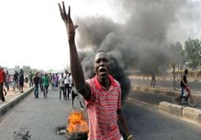
On the second day of the general strike in Nigeria that has paralyzed the country (to protest against rise in fuel prices), clashes between demonstrators and police led several people to death, including a child of 9 years and dozens injured. This was reported by several international medias.
The tension is strong right now in Nigeria with violent clashes in Kano (the north), where two people were shot dead and thirty wounded, according to an official hospital. The police, overwhelmed by the commitment of the protesters, launched tear gas and fired into the air against thousands of demonstrators who tried to invade the offices of the governor of Kano. The demonstrators also attempted to burn the home of the Governor of the Central Bank of the same federal state, Lamido Sanusi and set fire to the office of head of regional administration.
In Lagos (Nigeria’s economic capital) where the streets were completely empty except for the protesters, young people blocked a major highway by igniting tires, throwing stones at police. In Abuja, the federal capital, large demonstrations were also held, bringing together thousands of people. According to union leaders, the call for general strike was well observed in the country.
A time-unlimited general strike which continues in Nigeria arose from the government’s decision to remove subsidies on petroleum products on 1st January. A measure that has led to a sharp rise in gasoline prices, which affects most Nigerians, both for transport and for power generators of electricity. Largest producer of oil in Africa, Nigeria has been facing untimely cuts of electricity for several years.
This social unrest comes against a backdrop of political and religious tensions that have raised fears an escalation of violence between Muslims and Christians who populate equally Nigeria. Last Monday, demonstrators protesting against rising fuel prices have attacked a mosque in Benin City, southern, and a currency exchange bureau held by a muslims, making several minor injuries (according to the police).
The sectarian violences that shook for several months Nigeria are attributed to the islamist group Boko Haram. Its targets are located in the north, especially in its stronghold of Borno, and in the capital, Abuja, predominantly muslim.
